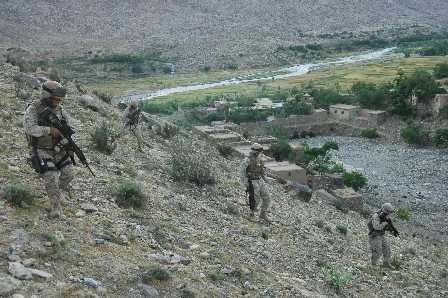Troops whose blogs are born from the battlefield must now consult with their superiors for OPSEC (operational security) violations.
In mid-2005, the task force I was assigned to in Afghanistan clamped down on military blogs and made us read and sign statements that we would not post blogs without prior approval from the command. Troops still did and I never heard of the rule being enforced through military law when the order was disobeyed.
Look around the Internet today, there are hundreds of military blogs out there – are they being targeted?
Somehow, as Reuters reported, the “Army's new regulation could affect service members who have returned from war zones and started blogs about their combat experiences.”
So that means this blog, The Bunker, could be subject to military authority? Good luck, boys, “Bring It On.” (I don’t see how they could stop discharged veterans from blogging about the war.)
This will not stop soldiers from blogging – it will serve as a tool to screw them if they are caught posting without military review of the content. What’s concerning about this apparently vague and hard to implement directive is that who is to say that the soldier’s supervisor is a good blog editor? Does that young officer or NCO charged with editing a soldier’s blog have the ability to understand security risks on a regional or theater-wide level? Who is to say that the supervisor’s personal bias might lead him to proofread and edit for content, rather than a security check? Could this be a veiled attempt to clamp down on soldier’s discussion of the war to prevent public understanding of inconsistencies of political rhetoric? After all, if Pvt. Joe Snuffy is seeing the war and writing in common language about his experiences – that goes a long way compared to the prepared prose of pontificating politicians.
Meanwhile, the Army in Baghdad has apparently embraced You Tube, with it’s on video channel – to highlight the hard fight undertaken by our troops in Iraq. These are voyeuristic glimpses into real battlefield situations – which show a reality that conventional news may not capture.
Here’s the link:
http://www.youtube.com/MNFIRAQ
Whatever the case, against blogging or for video clips on the Internet, the Army is taking notice of the Internet as a communication tool. Clamping down on the blogs mitigates information that may be damaging to the government position. Meanwhile, “reality” clips of war from Iraq may create a greater sense of pride among viewers who can have a better understanding of our soldiers and their fight.


1 comment:
Thanks for that nuanced, intelligent piece of analysis. I think you are right and this is one case where the spirit and the letter of the law are designed to be dissimilar from the outset. In general, though, I feel that information wants to be free and that inappropriate prosecution based on this rule will not go to far. Since blogging is a public affair, I'd like to think that it would be difficult to tamper with the evidence. But then, if emails can be "lost" maybe so can blog posts.
Post a Comment